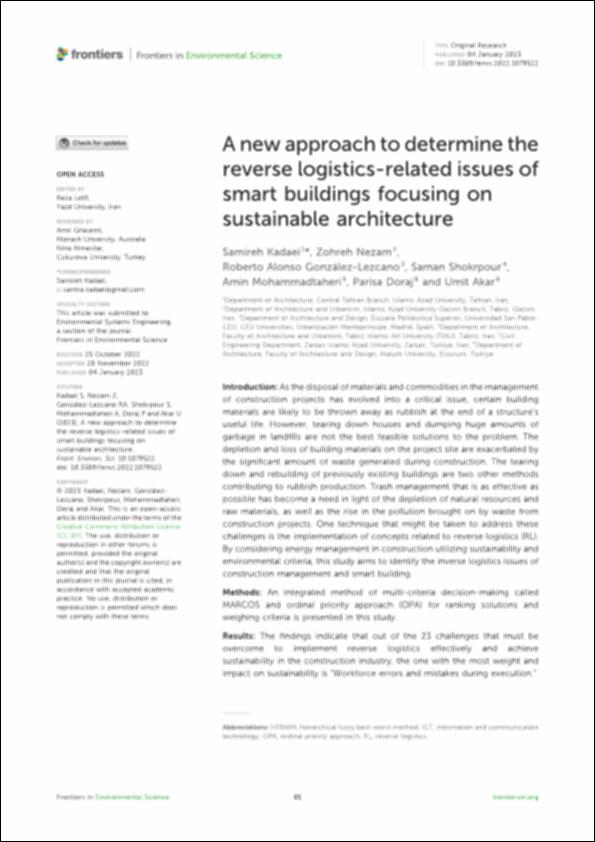Please use this identifier to cite or link to this item:
http://hdl.handle.net/10637/14541A new approach to determine the reverse logistics-related issues of smart buildings focusing on sustainable architecture
| Title: | A new approach to determine the reverse logistics-related issues of smart buildings focusing on sustainable architecture |
| Authors : | Kadaei, Samireh Nezam, Zohreh Shokrpour, Saman Mohammadtaheri, Amin Doraj, Parisa Akar, Umit González Lezcano, Roberto Alonso. |
| Keywords: | Reverse logistics; Construction management; Waste management; Construction projects; Sustainability |
| Publisher: | Frontiers |
| Citation: | Kadaei S, Nezam Z, González-Lezcano RA, Shokrpour S, Mohammadtaheri A, Doraj P and Akar U (2023), A new approach to determine the reverse logistics-related issues of smart buildings focusing on sustainable architecture. Front. Environ. Sci. 10:1079522. doi: 10.3389/fenvs.2022.1079522 |
| Abstract: | As the disposal of materials and commodities in the management of construction projects has evolved into a critical issue, certain building materials are likely to be thrown away as rubbish at the end of a structure’s useful life. However, tearing down houses and dumping huge amounts of garbage in landfills are not the best feasible solutions to the problem. The depletion and loss of building materials on the project site are exacerbated by the significant amount of waste generated during construction. The tearing down and rebuilding of previously existing buildings are two other methods contributing to rubbish production. Trash management that is as effective as possible has become a need in light of the depletion of natural resources and raw materials, as well as the rise in the pollution brought on by waste from construction projects. One technique that might be taken to address these challenges is the implementation of concepts related to reverse logistics (RL). By considering energy management in construction utilizing sustainability and environmental criteria, this study aims to identify the inverse logistics issues of construction management and smart building. An integrated method of multi-criteria decision-making called MARCOS and ordinal priority approach (OPA) for ranking solutions and weighing criteria is presented in this study. The findings indicate that out of the 23 challenges that must be overcome to implement reverse logistics effectively and achieve sustainability in the construction industry, the one with the most weight and impact on sustainability is “Workforce errors and mistakes during execution. Out of the ten potential solutions, “determining reverse logistics as a part of a sustainability program” and “strategic collaboration with reverse logistics partners” offer the most viable options for resolving the issue and overcoming the obstacles. |
| URI: | http://hdl.handle.net/10637/14541 |
| Rights : | http://creativecommons.org/licenses/by-nc-nd/4.0/deed.es openAccess |
| Issue Date: | 4-Jan-2023 |
| Center : | Universidad San Pablo-CEU |
| Appears in Collections: | Escuela de Politécnica Superior |
Items in DSpace are protected by copyright, with all rights reserved, unless otherwise indicated.


